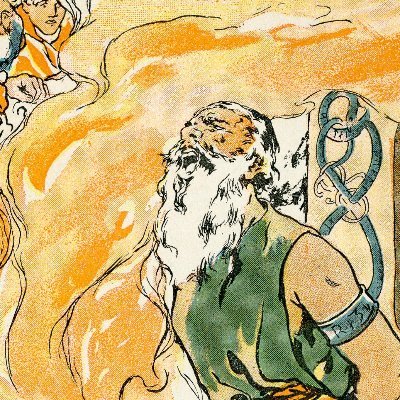I am stupid pls educate me. Were they actually poems?
A poem is anything written in verse, with clearly structured lines and usually carefully selected words that distinguish it from prose or conversational language.
You can have a poem without rhyming but you can't have a poem without rhythm. In fact, most people's idea of a poem as something that rhymes is just a really good way to sound corny and dumb.
Freestyle poetry still has lines of a certain length, and if there's no consistency in it, it doesn't sound good.
i only know about it from the movie paterson which i liked :comfy:
The don’t rhyme very much, but maybe they did in their original languages.
They often did rhyme in their original languages, yeah though your mileage may vary on the cultural standard for what constitutes rhyming. Sometimes words only rhyme in certain dialects. Sometimes these poems didn't rhyme, but instead exhibited similar features like consonance (same consonant sounds) or assonance (same vowel sounds) or alliteration (same starting sounds). You could be sure that there were certainly some kind of aesthetic choices going on with the words, even if it wasn't end-of-line rhyming.
Also the rhymes aren't always end-line rhymes, but can sometimes be found at the beginnings and middles of lines.
They do have rhythm, though.
Yes, they maintain (mostly) consistent meters throughout. Iliad was dactylic hexameter in the original Greek, I've been told.
That would be so exhausting to read lmao. Imagine if Das Capital was an insanely long poem.
Imagine if Das Capital was an insanely long poem.
There once was a coat from Berlin,
twas worth ten yards of linen.
From whence was its worth?
It didn't come from the cloth,
It came from hard work and spinnin.
people wouldn't necessarily tell the whole thing at once. You break it up.
Yes, both are very clearly poems with set rhythms and rhymes. They're epic poems, very long, but at their core still works of poetry rather than prose.
Beowulf and Paradise Lost actually don't rhyme too much, instead favoring alliterative verse and blank verse respectively. I think part of the issue is that people generally learn strict conceptions of poetry due to how it's reproduced in schools and children's media. Basically "poetry=rhymes, everything else is prose", so when works outside that understanding (especially older ones) come up there's a bit of a disconnect
This. It's just you have to zoom out further to better see the flow and rhymes.
I think the thing was back then they weren’t writing stuff down so they’d give stories a bit of a rhythm, rhyme or just general poetic quality to make it easier to recite and remember but idk I ain’t no nerd
Beowulf (like a lot of epics) was originally an oral tradition and thus was originally recited as verse because it's easier to memorise that way.
When it was finally written down, it retained the verse structure, which is all you really need to classify a written work as a poem.
Idk about Paradise Lost, never read it.
I've always wondered just how much gets lost when poetry gets translated to another language. The translator must take tons of liberties in order for it to read properly in the language it's being translated too.
sure, but this is true to a lesser extent for prose too. translation is partly a rewrite.
think of the pun about the east pole in winnie the pooh, that's not gonna work in any language where poles and poles arent homonyms.
but of course, the songs/poems in winnie the pooh needed even more work. eg, the pun about the trotechnician being always Alec only works if the name Alec is a homonym of the front part of the word electrotechnician.
(examples from the hungarian translation of winnie the pooh)
Dante's Divine Trilogy is a good example of a poem with a very specific rhyme scheme (the terza rima) that only infrequently gets retained in (English) translation. It's been translated so many times by so many different people, and the vibe can potentially be wayy off from the original language - to the point where there's a whole separate wiki page for the different translations.
Anyways read Pinsky's version of Inferno, he does a good job of keeping close to the Italian without sounding stilted
My translation of the Comedia says that Italian is a lot easier to rhyme in so they didn't bother lmao
Little off topic: Paradise Lost is more recent us (~350 years), than Beowulf is to Paradise Lost (~700 years)
back then, people were just really fucking stupid, and didn't understand the difference between prose and poetry (does it rhyme???). but the works were called poems, and by convention, the descriptions have stuck w/ us ever since.
back then, people were just really fucking stupid, and didn’t understand the difference between prose and poetry
good bit
Others have discussed meter and rhythm, but Beowulf is also alliterative which is why it doesn't rhyme. https://en.wikipedia.org/wiki/Alliterative_verse#Old_English_poetic_forms
there's a lot more focus on alliteration, consonance, and assonance, than strict end-of-line rhyming. Most of the people reciting this probably never saw it in writing. They possibly learned it orally, and recited it orally, and only later did people write it down.
Well I agree on the first point. I think everyone who has been recorded reciting it read it first most likely, since I don't think there are many or any native old English speakers left. But maybe that's not what you meant.
But maybe that’s not what you meant.
yeah i meant it was an oral tradition among the early medieval anglo saxon peoples who originally recited it. Meaning it was memorized and sung for a long time before being written down by someone literate.
i think the confusion stemmed from the fact that I said "reciting" in the present tense when I meant to say it in the past tense.











